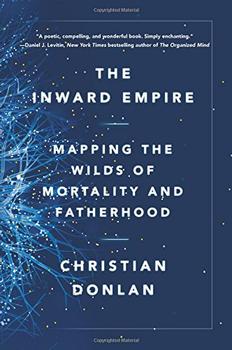Summary | Excerpt | Reviews | Beyond the Book | Readalikes | Genres & Themes | Author Bio

Mapping the Wilds of Mortality and Fatherhood
by Christian Donlan
Idiom, I noted to myself, and turned the page. What I should have noted was: imitation. I have done that a thousand times, asking Sarah before leaving the house whether it is okay to wear a checked shirt with checked trousers, if the checks, right, are of different sizes? I now understand that someone has been watching me, studying me, figuring out which stray bits of me to use as she constructs herself.
I also understand that sometimes things go offline in stages too. You lose one thing, and then a week later you lose another. Sometimes, like Ben, you get these things back. Sometimes, also like Ben, you do not.
It was a Christmas around the sagging middle act of my teens when my brother came home for the holidays to tell us that he had a brain tumor.
Except that's not quite right. That's how I now remember it, but then one crucial detail will contradict another, and over time I will realize that I do not know this story — my own family's story — as well as I think I do. Across the years, the version we all lived through has been compacted into the version we tell other people about — something that gets at the basic truth while ignoring the specifics. So let me think about this properly. Ben came home for the holidays, and he told us there was something wrong with him. And he told us not to worry about it.
It was 1994, I think, and I was busy failing a series of GCSEs. If I was sixteen, Ben would have been twenty-two. He seemed so old to me back then, but I now wince at the thought of having to do all that, face all that, when you're just twenty-two.
Tall and stylishly delicate, Ben was a stark icon of my childhood. He was a mystery, to me and to everyone else, which meant that he was endlessly interesting. He was a topic as much as a sibling. "Your brother has this smile," a friend of Ben's confided in me once, possibly searching for more information, "that suggests he knows things nobody else could ever know. It's an enigmatic smile. You could follow him around for twenty-four hours a day, every day of the week for ten years, and he'd still greet you with that smile.
"But I've worked him out," Ben's friend continued. "I know what his secret is." I remember feeling my pulse flutter. My brother's friend shook his head. "He's just a man who knows how to do an enigmatic smile."
"I don't think that's quite it," I said after a pause.
"Neither do I," admitted my brother's friend.
I would never be like Ben, but at times I got tantalizingly close. We would say the same things at the same time, Ben and I. The world struck us both as being funny in the same way — or I learned to appreciate the mixture of mockery and sentimentality with which he approached life. I loved these moments of synchronicity, and I always longed for the next one, knowing, at the same time, that they cannot be fabricated or forced. They happen or they don't.
Ben had been away at college taking an access course for university when he started to have seizures, shaking him out of his seat in class and once launching him off his motorbike. These seizures were caused by a cyst, apparently. A pool of fluid inside the brain, pushing down against vital matter. An underground lake, dripping and unseen.
My family has spent twenty years trying to forget much of this period, but what we have actually achieved between us is an understanding that memory doesn't really work like that. It doesn't yield to pressure — and sometimes it stubbornly seems to dig in. I could go from any point in any conversation with any of my family to talk of Ben's illness, and nobody would register a segue: it remains, in rest, at the forefront of our minds. All I need to do is think of Ben, now middle-aged and living in Worcester and working in a library, and the whole thing comes back to me in a rush, memories stacked and loosed, like cards shuffled and then sprayed across the room. The seizures, the cyst, the night he told us all about it.
Excerpted from The Inward Empire by Christian Donlan. Copyright © 2018 by Christian Donlan. Excerpted by permission of Little Brown & Company. All rights reserved. No part of this excerpt may be reproduced or reprinted without permission in writing from the publisher.
Your guide toexceptional books
BookBrowse seeks out and recommends the best in contemporary fiction and nonfiction—books that not only engage and entertain but also deepen our understanding of ourselves and the world around us.